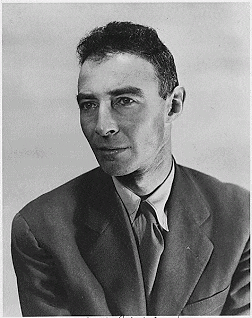
J. Robert Oppenheimer (official portrait – public domain)
Oppenheimer was born on April 22, 1904 to a wealthy German-Jewish couple, Julius and Ella Oppenheimer, and grew up on Riverside Drive in Manhattan (Bird & Sherwin, 2005, pp. 9-11). He attended the progressive Ethical Culture School, on Central Park West, where he was steeped in the ethos of the school: “deed, not creed.” The Ethical Culture Society, a non-religious offshoot of Judaism, believed that individuals shaped their own destinies, but should maintain a commitment to social justice and humanitarianism. Here, young Robert Oppenheimer was allowed to explore his academic interests to the fullest and first discovered chemistry and physics. (pp. 16, 21-22).
After graduating from Harvard with a Bachelor’s degree in chemistry in 1925 and from the University of Gottingen’s Institute of Theoretical Physics with a doctorate in 1927, he accepted a double appointment to teach at the California Institute of Technology and the University of California, Berkeley (pp. 38, 66, 73). He became the scientific director of the Los Alamos National Laboratory, the lab that, under his management, developed and tested the first atomic bomb. The first test, “Trinity,” occurred on July 16, 1945 in the Jornada del Muerto desert of New Mexico.
After graduating from Harvard with a Bachelor’s degree in chemistry in 1925 and from the University of Gottingen’s Institute of Theoretical Physics with a doctorate in 1927, he accepted a double appointment to teach at the California Institute of Technology and the University of California, Berkeley (pp. 121, 124). He became the scientific director of the Los Alamos National Laboratory, the lab that, under his management, developed and tested the first atomic bomb. The first test, “Trinity,” occurred on July 16, 1945 in the Jornada del Muerto desert of New Mexico.
Documentary clip featuring Oppenheimer speaking about the Trinity test.
Around 1936, Oppenheimer became involved in leftwing political movements, such as fundraising for the Spanish Civil War and in organizing for Local 349 of the East Bay Teacher’ Union (pp. 121, 124). Some thought he was a member of the Communist Party, but there is no evidence whether he was or not (p. 135). However, his former associations and publicly-expressed moral qualms about nuclear weapons would cause him many problems after World War II; FBI investigations and an Atomic Energy Commission (AEC) hearing led to the revocation of his security clearance in 1954 (pp. 537-541). Oppenheimer spent his last years in Princeton and died on Feb. 18, 1967. (p. 587). Oppenheimer is best remembered today as the scientific director of the Manhattan Project and “the father of the atomic bomb.”
Back to NYC Nuclear Archive Home
Back to Invention of the Nuclear Bomb
Next Page: The Manhattan Project
By Catherine Falzone, 2012. Adapted from Nuclear New York archive with permission.
